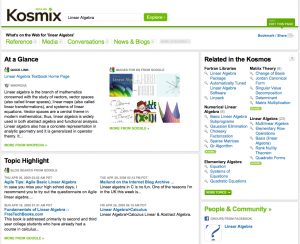Universal Search…for learning?
What might “universal search” for learning look like?
I first heard the phrase “Universal Search” connected with a Google announcement in 2007.
“The ultimate goal of universal search is to break down the silos of information that exist on the web and provide the very best answer every time a user enters a query… Google’s vision for universal search is to ultimately search across all its content sources, compare and rank all the information in real time, and deliver a single, integrated set of search results that offers users precisely what they are looking for… [fusion_builder_container hundred_percent=”yes” overflow=”visible”][fusion_builder_row][fusion_builder_column type=”1_1″ background_position=”left top” background_color=”” border_size=”” border_color=”” border_style=”solid” spacing=”yes” background_image=”” background_repeat=”no-repeat” padding=”” margin_top=”0px” margin_bottom=”0px” class=”” id=”” animation_type=”” animation_speed=”0.3″ animation_direction=”left” hide_on_mobile=”no” center_content=”no” min_height=”none”][T]he company will incorporate information from a variety of previously separate sources – including videos, images, news, maps, books, and websites – into a single set of results.” (Google, 2007)
What does this mean for “learning”?
One of the philosophies that we developed while I was at COSL was that we shouldn’t build education-specific tools and services. (And that we should encourage others to not build education-specific tools and services.) While at first glance, the education, teaching and learning “space” might seem to be unique, requiring it’s own customizations…at the end of the day, it’s just a slice of the world as a whole. Couple that observation with the research that in the age of Google, people go to search engines and “popular” sites like del.icio.us and flickr rather than going to education specific portals when looking for resources. (Manduca, et al., 2005; McMartin, et al., 2008)
Accepting the, mostly reasonable premise, that most people who want to learn something, like the university course topics available from OpenCourseWares or about topics listed in educational repositories/referatories like the National Science Digital Library, go to Google first, what does that mean for a “universal search for learning” given that right now, most search engines segment content by type (text/documents, images, vidoes, questions, etc.)?
Well, perhaps a company called Kosmix might be on to something. I read an article on TechCruch earlier this month about another take on universal search. Kosmix brings together definitions from Wikipedia, search results from Google, communities from Facebook, conversations/Q&A from Yahoo! Answers, videos from YouTube/Trueveo/Blinkx, images from Yahoo!, books from Amazon, blog posts from Meehive and Reviews and Guides from Howcast. Sounds interesting, right?
Let’s do a search for “linear algebra” and assume that I’m interested in getting a general introduction to this topic. (My current “normal” search that I use in presentations is “angular momentum” which works as well, the results aren’t quite as pretty.)
Click on the image to see the full screenshot or visit Linear Algebra on Kosmix. Interesting isn’t it? If I wanted to learn about a topic, I think this is what I’d like to see. A brief description about the topic from Wikipedia, a link to videos and websites to learn more in depth. Folks answering questions directly related to the topic. All available from one site. I think this mix of content types and sources helps provide the context a user needs to understand a topic.
What does this mean? I’m not sure. But I think a “universal search” like this might lead to something interesting for learning in the Web age. What happens when Google finally deploys their “universal search”? Or will Kosmix survive and gain a wide user base? Or should we at OEIT, or someone in the “education” space, pull together a mashup like this and make these tools available on sites where students/learners/the world at large already visit like OCWs?
What do you think? Would you use Kosmix to learn? What does this mean for educational content providers like OCWs?
[/fusion_builder_column][/fusion_builder_row][/fusion_builder_container]


